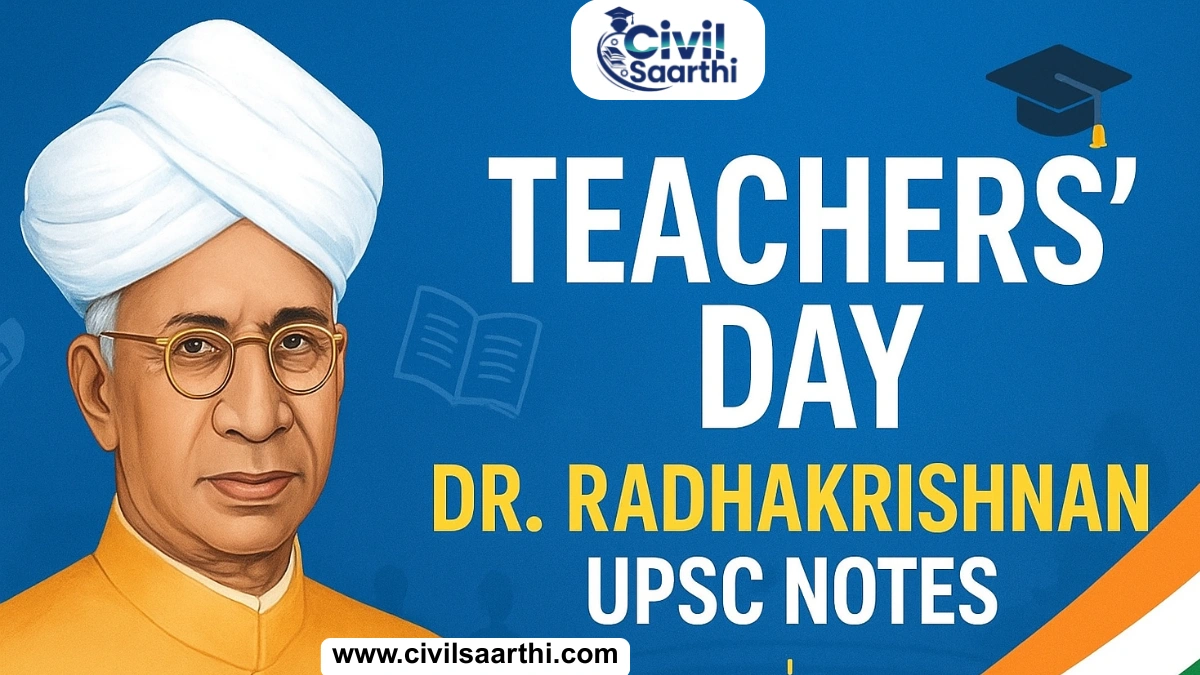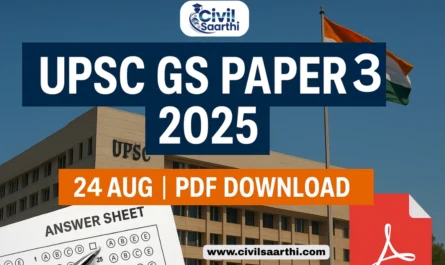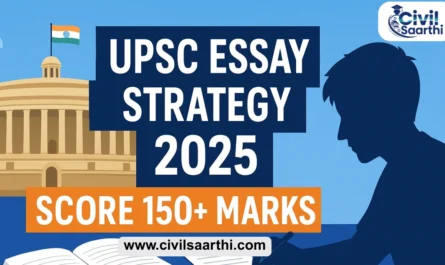Teachers’ Day in India is celebrated every year on September 5, marking the birth anniversary of Dr. Sarvepalli Radhakrishnan. He was not just a President of India but a philosopher, teacher, and visionary who believed education was the true foundation of nation-building. For UPSC aspirants, his life is a perfect blend of ethics, knowledge, and service that provides lessons for exams as well as life.
Early Life and Education of Dr. Sarvepalli Radhakrishnan
The childhood of Dr. Radhakrishnan reflects how determination and education can transform lives. Born into a modest family in Tiruttani, Tamil Nadu, on September 5, 1888, he overcame financial struggles to emerge as a brilliant student.
Completed schooling in Tirupati, Vellore, and later at Madras Christian College.
Specialized in Philosophy, earning both BA and MA degrees.
His academic brilliance earned him scholarships that supported his education.
Academic Career of Dr. Sarvepalli Radhakrishnan
Dr. Radhakrishnan’s professional life was dedicated to teaching and spreading knowledge. His lectures and writings established him as one of the finest interpreters of Indian philosophy.
Lecturer at Madras Presidency College in 1909.
Professor at University of Mysore (1918) and Calcutta University (1921).
Vice-Chancellor of Andhra University and later Banaras Hindu University.
Served as Spalding Professor of Eastern Religions and Ethics at Oxford University.
His academic journey highlights the importance of educators as nation-builders, a theme closely linked with Teachers’ Day.
Dr. Sarvepalli Radhakrishnan Philosophy and Intellectual Contribution
Dr. Radhakrishnan is remembered as a philosopher who brought Indian spiritual thought to global platforms. He explained complex ideas in simple language, making philosophy accessible to ordinary people.
Advocated Advaita Vedanta, reinterpreting it in modern terms.
Believed education must create a free, creative, and ethical human being.
Promoted dialogue between Eastern and Western philosophies.
Emphasized that religion must be rooted in experience, not blind rituals.
His intellectual work is highly relevant for UPSC essays and ethics, where critical thinking and universal values are tested.
Dr. Sarvepalli Radhakrishnan Role as Statesman
Dr. Radhakrishnan’s transition from philosopher to statesman shows how knowledge can guide governance. He entered politics not through elections but through moral authority and intellect.
Ambassador to the Soviet Union (1949–1952) during the Cold War.
First Vice President of India (1952–1962).
Second President of India (1962–1967), setting a high ethical standard for the post.
His presidency reflected dignity, simplicity, and wisdom, qualities essential for civil servants and administrators.
Dr. Sarvepalli Radhakrishnan Awards and Honours
Throughout his lifetime, Dr. Radhakrishnan received awards that celebrated his scholarship and service. These honors also highlight India’s respect for education and philosophy.
Knighthood – 1931
Bharat Ratna – 1954
Peace Prize of the German Book Trade – 1961
Order of Merit (UK) – 1963
Templeton Prize – 1975 (donated to Oxford University)
The Origin of Teachers’ Day
The story of Teachers’ Day in India is deeply tied to Dr. Radhakrishnan’s humility. In 1962, when his students wanted to celebrate his birthday, he suggested that the day be dedicated to teachers instead.
His famous words: “Instead of celebrating my birthday, it would be my proud privilege if September 5 is observed as Teachers’ Day.”
Since then, every September 5 is celebrated across India as Teachers’ Day.
This gesture shows his belief that teachers are the true torchbearers of society.
Importance of Teachers’ Day
Teachers’ Day is not just a cultural celebration; it carries national and ethical importance. It reminds students and citizens of the vital role teachers play in shaping the destiny of the nation.
Guru-Shishya Tradition: Reflects India’s cultural respect for teachers.
Nation Builders: Teachers create responsible citizens.
Moral Reminder: Reinforces values like gratitude and humility.
In today’s world, it emphasizes that education is not only about skills but also about building values and leadership qualities.
Dr. Radhakrishnan’s Vision of Education
For Dr. Radhakrishnan, education was not just about literacy, it was about transforming society. He envisioned education as a tool for moral and spiritual growth.
Encouraged critical thinking and creativity.
Stressed on character-building and ethics.
Promoted religious tolerance and universal brotherhood.
Saw teachers as guides, not just instructors.
His vision matches the modern goals of the National Education Policy (NEP 2020), making his philosophy timeless.
Inspirational Quotes for UPSC Aspirants
Dr. Radhakrishnan’s quotes continue to inspire students, teachers, and leaders. They are especially useful in UPSC essays and ethics papers.
“Teachers should be the best minds in the country.”
“When we think we know, we cease to learn.”
“The true teachers are those who help us think for ourselves.”
“The end-product of education should be a free creative man.”
These lines highlight his belief in lifelong learning and independent thinking, both vital for administrators.
Teachers’ Day in Contemporary India (2025)
Teachers’ Day 2025 is celebrated with renewed focus on education in a changing world. From digital learning to AI in classrooms, the role of teachers is evolving.
School programs honor teachers through speeches and cultural events.
National Teachers’ Awards are presented by the President of India.
Discussions focus on equitable access, NEP 2020 reforms, and digital education.
The day is not only about celebration but also about reflecting on educational challenges and reforms in India.
Timeline of Dr. Radhakrishnan’s Life
The journey of Dr. Sarvepalli Radhakrishnan spans from a humble childhood to becoming the President of India and a global philosopher. The following timeline provides a quick overview of his most significant milestones.
| Year | Event |
|---|---|
| 1888 | Born in Tiruttani, Tamil Nadu |
| 1909 | Began teaching at Madras Presidency College |
| 1931 | Vice-Chancellor of Andhra University |
| 1939 | Vice-Chancellor of Banaras Hindu University |
| 1949 | Ambassador to Soviet Union |
| 1952 | Became India’s first Vice President |
| 1962 | Became President of India |
| 1962 | First Teachers’ Day celebrated |
| 1967 | Retired from public life |
| 1975 | Won Templeton Prize |
| 1975 | Passed away on April 17 |
Dr. Sarvepalli Radhakrishnan’s Literary Works
The literary contribution of Dr. Radhakrishnan is immense, as he dedicated his life to explaining Indian philosophy to the world. His writings connected Eastern spirituality with Western rational thought, making Indian philosophy accessible to global audiences. His books are still used as reference texts in universities and UPSC preparation for philosophy optional.
Major Works of Dr. Radhakrishnan
The Philosophy of Rabindranath Tagore (1918)
His first book, highlighting the spiritual and philosophical depth of Tagore’s works.
Emphasized the synthesis of humanism, nationalism, and universalism.
Indian Philosophy (Vol. I – 1923, Vol. II – 1927)
Considered his magnum opus.
Presented Indian philosophical schools like Vedanta, Samkhya, Nyaya, and Buddhism to the Western world.
Established him as an authority on comparative philosophy.
The Hindu View of Life (1926)
A collection of his famous Upton Lectures at Oxford.
Explained Hinduism as a way of life rather than a rigid religion.
Stressed tolerance and universal values.
An Idealist View of Life (1932)
Based on his Hibbert Lectures in London.
Focused on spiritual experience as the essence of life.
Combined philosophy with practical ethics.
Eastern Religions and Western Thought (1939)
Comparative study of Indian and Western philosophy.
Promoted dialogue between cultures and faiths.
Religion and Society (1947)
Discussed the role of religion in building a just and moral society.
Emphasized education as a tool for ethical transformation.
The Principal Upanishads (1953)
His most acclaimed translation and commentary.
Made the Upanishads understandable to both Indian and international readers.
Recovery of Faith (1955)
Written in a post-World War II context.
Addressed the crisis of faith and spirituality in the modern world.
Religion, Science and Culture (1968)
Collection of essays on the interconnection of spiritual and scientific thought.
Conclusion
Dr. Sarvepalli Radhakrishnan remains an enduring symbol of knowledge, humility, and service. His decision to dedicate his birthday to teachers transformed September 5 into a national day of gratitude. For UPSC aspirants, his life is more than inspiration, it is a framework of values that can shape responsible leadership.
Teachers’ Day is not only about remembering one man but about honoring the entire teaching community that continues to guide India’s future. Just as Radhakrishnan believed, teachers are the true nation-builders, and education is the most powerful tool for social transformation.
Dr. Sarvepalli Radhakrishnan FAQs
Q1. Who was Dr. Sarvepalli Radhakrishnan?
Dr. Sarvepalli Radhakrishnan was a renowned philosopher, teacher, statesman, and the second President of India. He is remembered for his contribution to Indian philosophy and education.
Q2. Why is Teachers’ Day celebrated on 5th September in India?
Teachers’ Day is celebrated on 5th September, Dr. Radhakrishnan’s birthday, to honor his belief that teachers are the true builders of the nation. When students wanted to celebrate his birthday, he suggested dedicating the day to teachers instead.
Q3. What was Dr. Radhakrishnan’s philosophy of education?
He believed education should develop moral, intellectual, and spiritual values. For him, education was not just about knowledge but about shaping character and building responsible citizens.
Q4. Which are the most famous books written by Dr. Radhakrishnan?
Some of his major works include Indian Philosophy (Vol I & II), The Hindu View of Life, An Idealist View of Life, The Principal Upanishads, and Recovery of Faith.
Q5. What awards did Dr. Sarvepalli Radhakrishnan receive?
He was awarded the Bharat Ratna (1954), Templeton Prize (1975), and received global recognition including Knighthood and honorary degrees from international universities.
Q6. How is Dr. Radhakrishnan relevant for UPSC preparation?
His life and works are useful in GS I (Indian culture & history), GS IV (Ethics – values, education, leadership), Essay Paper, and Philosophy Optional. His quotes also enrich answers.
Q7. When did Dr. Radhakrishnan serve as President of India?
He served as the second President of India from 1962 to 1967, after being the first Vice President from 1952 to 1962.







